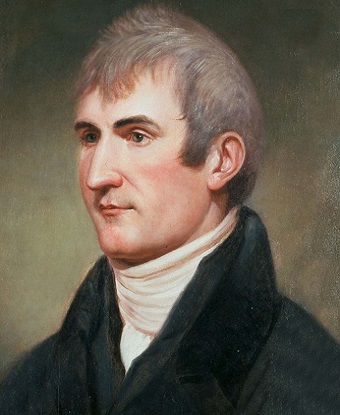Last updated: August 23, 2025
Person
Meriwether Lewis

Meriwether Lewis was born in Albemarle County, Virginia in 1774; the first child of Lucy Meriwether and William Lewis. His father died in 1779 of pneumonia, and shortly after his mother remarried and moved the family to Georgia. While living in Georgia, Lewis would often travel to Virginia to manage his family’s estate. Years later, while Lewis was in his late teens, his stepfather also died, leaving Lewis as the head-of-household for his mother and four siblings.
Lewis enlisted in the U.S. Army in 1794, and by 1800 he was promoted to captain. While in the army he became friends with a commanding officer, William Clark. In 1801 he became Thomas Jefferson’s personal secretary after Jefferson had been elected President in 1800. Lewis and Jefferson had lived near each other in Virginia, and had thus become well acquainted. Lewis served in this role until 1803, at which time he was selected to lead an expedition West.
Lewis prepared for his journey by procuring supplies and studying with leading scientists. He studied astronomy under Andrew Ellicott, botany under Dr. Benjamin Smith Barton, surveying and mathematics under Robert Patterson, medicine under Dr. Benjamin Rush, and anatomy under Dr. Caspar Wistar.
He, along with William Clark, led the Corps of Discovery to the Pacific Ocean between 1804 and 1806. Upon their return Jefferson appointed Lewis as Governor of the Louisiana Territory, a post that he began in early March 1807. Lewis had difficulty in this post, which included personality conflicts and questions about how government money was being spent. He began drinking more heavily, and his relationship with Jefferson became increasingly strained. In 1809 Lewis decided to travel to Washington DC to plead his case in front of the new administration. On October 11, 1809, while staying in a Tennessee inn along the Natchez Trace Parkway, Meriwether Lewis shot himself, taking his own life.
He is buried near Grinder’s Stand, and in 1848 a memorial was erected in his memory.
Sources:
https://www.nps.gov/lecl/learn/historyculture/meriwether-lewis.htm
https://www.nps.gov/natr/learn/historyculture/meriwether-lewis.htm
http://www.pbs.org/lewisandclark/inside/mlewi.html
